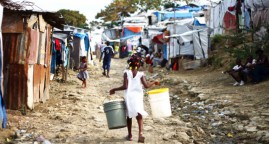How Environmental security and human rights are linked?
Article published on Modern diplomacy website on 10/05/2017 by Mehwish Akram
The human rights are directly related to environmental security. According to experts, the natural resources and their fair distributions are essential to ensure the human rights. Humans are dependent on the suitable environment for their survival.
The UN and other international donor agencies are working together to decrease loss of the biodiversity and achieve a significant improvement in the lives of people across the globe. The sustainable environment is required for ensuring human rights as every human has right to live in a safe and secure environment. The linkage between human rights and environmental security are closely related. According to the environmentalist, sustainable environment is needed for human existence.
The statistics are showing dangerous signs. For example, there is no global water shortage even then half of the world’s population facing the scarcity of water. The use of water has increased with the growth of the population for the past century. The one-sixth of the world’s population has no access to safe drinking water. There is an improvement in sanitation world-wide particularly, in developing regions. These problems are far worse in the rural areas of sub-Sahara Africa and spread to urban slums too. The slum lacks sanitation, water facilities, sustainable housing and sufficient living area.
There are other MDGs that are clearly associated with human rights and environment. For example, people living in extreme hunger and poverty in Goal 1 requires a healthy ecosystem, have rights to resources and inadequate access to information. The lack of participation in decision-making makes people more vulnerable to natural disasters. The Universal primary education in Goal 2 is linked to sustainable development. The household responsibility of people living in poverty prohibits them to allow their children, especially girls to attend school. Moreover, school is important for empowerment of the youth to become the useful member of society by getting training from formal school.
The Goal 3 focuses on environmental justice because females are pressurized for collecting water and fuel. They have limited role in decision-making and mostly lack access to land ownership in developing countries. Child mortality in Goal 4 is highest in children under the age of five due to inadequate sanitary living conditions, unclean water, and indoor air pollution. Maternal health in Goal 5 is affected because of indoor air pollution, the burden to bring water and fuel. The increased cases of malaria are due to deforestation and man-made natural disasters.
According to the recent 2009 MDG Report of UN the growth of four goals of poverty reduction, universal primary education, reduced child mortality and some dimensions of environmental degradation like ozone depletion are not given due importance. However, the recent global economic crisis has decreased the progress of environmental projects due to lack of funds. The report suggested that environmental justice is not the focus in power politics at international level. In every region, the living standard of the urban poor has improved but a growth of slum areas cannot be overlooked. It shows the efforts to preserve the natural resource is not effective in the context of climate change, fisheries, forest, and water depletion. The report recommended that the developed world has the ability to eliminate poverty but they are unable to resolve it.
Despite the efforts of the UN and other advocacy groups from around the world the progress toward environmental justice has been slow. The environmental problems are getting worse than before. The implementations of “soft laws” have failed as globalization has increased the resource depletion. The experts suggested that existing human rights approaches are not enough in highlighting the environmental rights. In the global capitalism, human security and environmental protection are subordinated to economic growth. The double standard of capitalism contributes in systematic environmental degradation and human rights violations.
Throughout the world, people are facing the harmful effects of environmental damage in form of depletion of ecosystems and shortage of the water. The environmental degradation is affecting different segments of the society particularly, the marginalized people who are deprived of their basic needs. The environmental degradation will exclude them from their respective societies. The rights of marginalized people especially the minorities will be exploited by the majority group in their countries. The abuse of human rights is apparent in different regions in terms of resource distribution. For example, in Sudan people are fighting over scarce resources as result of environmental degradation.
The relationship between environmental degradation and human rights violations have been overlooked by the most organizations and governments as they don’t give due importance to this issue. Human right advocates promote civil and political rights into their agendas and ignore the concerns of the environmentalists who focus mostly on natural resource preservation and address the human impacts of environmental abuse. The victims of environmental degradation remain unprotected by the laws and mechanisms established to prevent human right abuse and damage to natural resources of the world. To conclude, the human right abuse is closely related to environmental degradation and debated at international forums.
Related Articles
Bakhita centre for female victims of trafficking inaugurated in Lagos
04/02/2019. The “Bakhita Empowerment” centre is an initiative of the Order of Malta with the Congregation of the Sisters of St. Louis for protecting and rehabilitating young women victims of prostitution and human trafficking when they return to Nigeria.
Interview with Pedro Medrano Rojas, UN Senior Coordinator for the Cholera Response in Haiti
03/04/2015. The persistence of cholera in Haiti is mainly due to the lack of access to clean water and appropriate sanitation facilities …
Princes and bankers and aid! Oh my!
05/26/2017. Despite external criticism and some of their own internal discomfort, more humanitarians are engaging with the World Economic Forum than ever before and see such spaces as critical for solving today’s complex crises.





